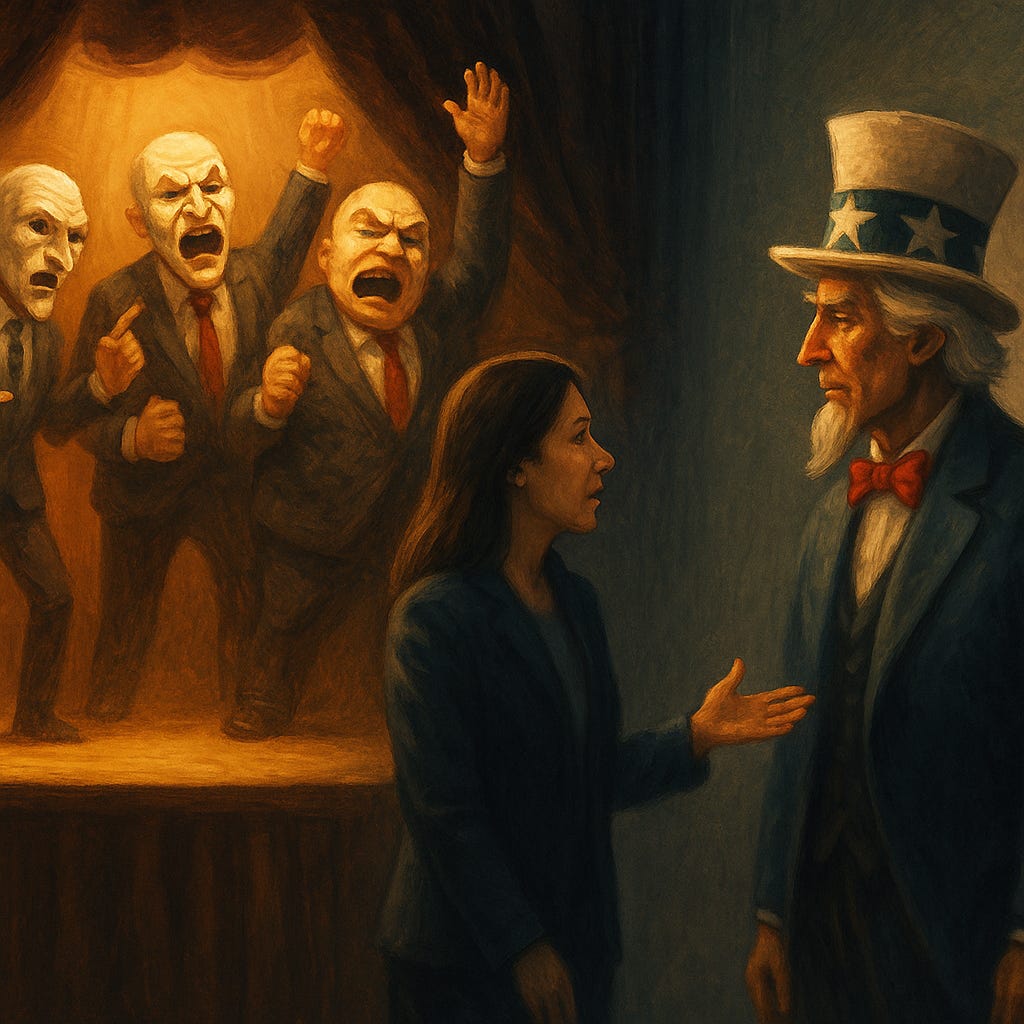Ottawa’s Failed Panic and Empty Threats Vindicate Danielle Smith’s Leadership
In the tariff crisis of 2025, Canada tested its mettle, and the result was revealing. At the center stood Premier Danielle Smith, who chose steady, substantive leadership over juvenile posturing and theatrical bravado. Ottawa’s Prime Minister Mark Carney and Alberta NDP leader Naheed Nenshi indulged in overly-inflated martial rhetoric and fear-driven posturing.
Carney’s tactics have failed to secure any meaningful results, and he now proposes to do what Premier Smith was doing from the start. My purpose is not to flatter Alberta’s premier, but to show the self-serving strategy and base tactics of those who attacked her.
In short, given the state manipulation of media and the self-inflicted amnesia of the age, I would like to document some of what the progressive politicians wanted to do, and what they said, to remind us of the shallow leadership in the country, and to say what the mainstream media isn’t going to say. Danielle Smith’s calm, clear-eyed approach was prudent leadership. The rest was a useless political spectacle geared exclusively to improve the electoral fortunes of the ruling Party in Ottawa. The strategy was devised to serve the interests of the federal Liberal Party, not the interests of Canadians.
When the Storm Hit: Carney’s Rhetoric Without Results
The shock arrived in January, though the first stab was delivered to Justin the previous Fall when he visited Trump in Mar-a-Lago on November 29th. Donald Trump, newly back in the White House, announced a raft of tariffs on Canadian steel and aluminum and threatened levies on agriculture and energy-related products. The move struck at the very architecture of the United States–Mexico–Canada Agreement (USMCA), the framework meant to stabilize continental trade. Canada sends three-quarters of its exports to the United States; the relationship is not optional or trivial; it is crucial. This dependency deepened during the Trudeau years, notably in his refusal to approve infrastructure for selling Canadian energy overseas and in declining pleas from Europeans to sell them natural gas. Ottawa likes to talk about diversification, but when three in four dollars of export income depend on one customer, the arithmetic speaks for itself.
Carney, still in the honeymoon phase of his premiership, treated the shock as an opportunity to prove his campaign rhetoric. During debates, he had cast himself as the lone Canadian able to face down Trump, a Trump-whisperer of sorts, boasting of his international experience as governor of the Bank of England and promising to “crush” the Americans in trade negotiations. When the cameras turned to him, he reached for the hyperbolic language of battle.
On March 27, 2025, Prime Minister Carney told reporters: “Nothing is off the table regarding possible countermeasures.” Carney declared on that same day that “the era of close economic integration and security cooperation with the United States is over,” following an announcement of sweeping U.S. auto tariffs. This was a radical policy shift in the history of the country, an announcement made without any debate in the public square or in Parliament. The longstanding Canada–U.S. partnership built on deep integration was no longer intact, and there would be “no turning back” from this shift. Many chose to celebrate this announcement without considering the consequences.
Four days later, on March 31, Carney expanded the message in a more impassioned speech: “We won’t back down. We will respond forcefully. Nothing is off the table to defend our workers and our country.” The environmentalist woke banker was now the defender of Canada’s working class, the same working class he declared seditious for questioning government policy during the truckers’ protest.
The language was now definitive, dramatic, and even intoxicating to some Canadians. Ottawa reporters applauded the elbows-up posture. But it was rhetoric without a plan.

Danielle Smith’s Steady Course: Strategy Over Spectacle
Smith’s view of the crisis was rooted not in theatre but in facts. Alberta exports over 3.3 million barrels of oil a day to the United States. That crude feeds refineries in the Midwest and the Gulf Coast, which in turn supply gasoline and diesel back into Canadian markets. Oil is not simply Alberta’s business; it is the circulatory system of the North American economy. To threaten to cut it off would be to shoot ourselves in the leg to prove a point.
Smith said as much at press conferences in mid-January. She warned that if Ottawa tried to embargo energy exports as retaliation, the fallout would be national: “Refineries in Ontario and Quebec, industries across the country, all depend on Alberta’s oil. Empty threats may make headlines, but they won’t keep Canadians working.”
She was clear that oil must not become a weapon. She was also pointing out the crucial strategic reality that, citing oil flows to the US, one would have to cut oil flows to Eastern Canadian markets from Alberta, an absurd way to hurt Canada’s largest market for the sake of hurting Americans. Who negotiates by putting a loaded weapon to their own head?
If Trump was enlisting chaos, Danielle Smith understood that bringing more chaos into the equation would only serve the interests of those weaponizing chaos: “Our energy exports are a source of stability, not leverage.”
Smith’s rationale ran deeper than provincial parochialism; it rested on the realistic understanding that energy flows sustain industries coast-to-coast. Instead of using oil as a cudgel, she pressed for engagement. Her trip to Mar-a-Lago, facilitated by Kevin O’Leary, was ridiculed by critics as social climbing. But Smith’s purpose was straightforward: to remind Trump and his circle that Alberta’s oil kept America’s economy moving, and that undermining that relationship would hurt both sides.
It was not glamorous politics. It did not satisfy the simplistic appetite for “elbows up” or the primal need to see Canada throw punches. But it was prudent. It sought to preserve what mattered most: stability, credibility, and the livelihoods tied to cross-border trade.
To continue reading, please join our Haultain Substack here for free.

